Essential Personal Hygiene Checklist for Tween and Teen Girls
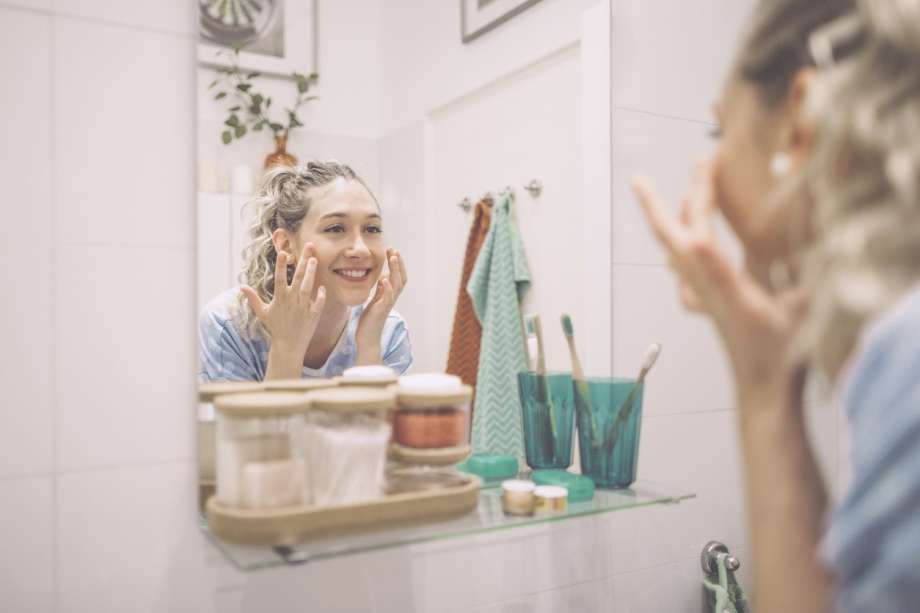
Personal hygiene for teens isn’t always the easiest subject to broach. Your daughter’s body is changing and suddenly she has hair in new places, is sweating from just about everywhere, and the body odor — well, let’s just say that she doesn’t smell as sweet as she used to.
Even though personal hygiene is something you think of as common sense, tweens need to learn about the impact puberty will have on their bodies and how to handle it.
If your tween or teen lacks a serious hygiene routine, check out our top tips for helping your daughter through this time!
Checklist Download: The Essential Personal Hygiene Checklist for Tween and Teen Girls
When is it Time to Have the Personal Hygiene Talk?
Hygiene and healthy habits are always important. But now that your daughter is going through (or ready to go through) puberty, these behaviors take on a whole new meaning. Before we dig deep into personal hygiene habits for the tween and teen set, you might need to learn more about puberty and the timing of the “talk.”
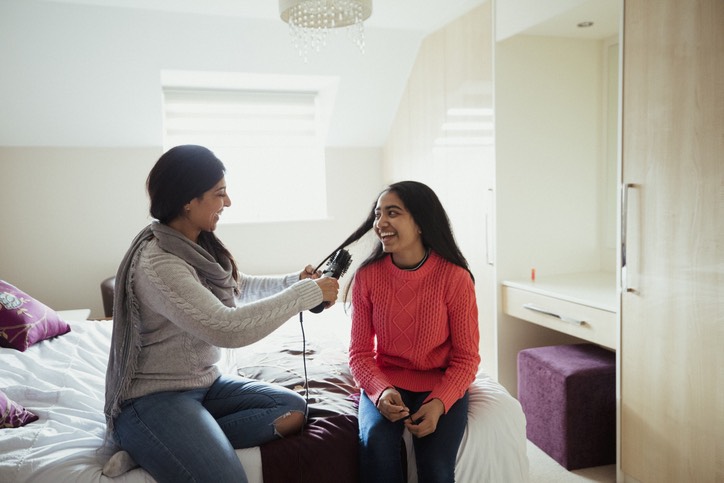
According to the Cleveland Clinic, puberty in girls typically starts anywhere from 8- to 13 years of age. During this time the breasts begin to grow or bud, the areolas enlarge, pubic hair may sprout, and your daughter may have a noticeable height change of two or more inches each year.
Between ages nine and 14 your daughter may have more pronounced physical changes. These include increased breast budding, coarser public hair, the development of underarm hair, and oily, acne-prone skin. The Cleveland Clinic also notes that young girls may grow three or more inches per year at this time.
For many girls, the next stage of puberty happens between ages 10 and 15. This near-final stage of puberty includes continued breast growth, height growth, continuation of acne, and even more pubic hair.
Along with breast, pubic hair, height, and other physical changes, your daughter’s body odor may change or intensify as she reaches puberty. This noticeable hygiene issue makes it important to start the “talk” before your kiddo develops a stinky situation.
Ideally, you will bring up health and personal hygiene before an offensive odor becomes obvious. But this may happen before you even realize your daughter is going through puberty.
Given the fairly wide age range for puberty, you may want to start talking about “teen hygiene” topics well before your child reaches adolescence. In other words, it’s perfectly okay to introduce the subject when your kiddo reaches her upper elementary school years.
How Should You Talk to Your Preteen or Teen About Health and Hygiene?
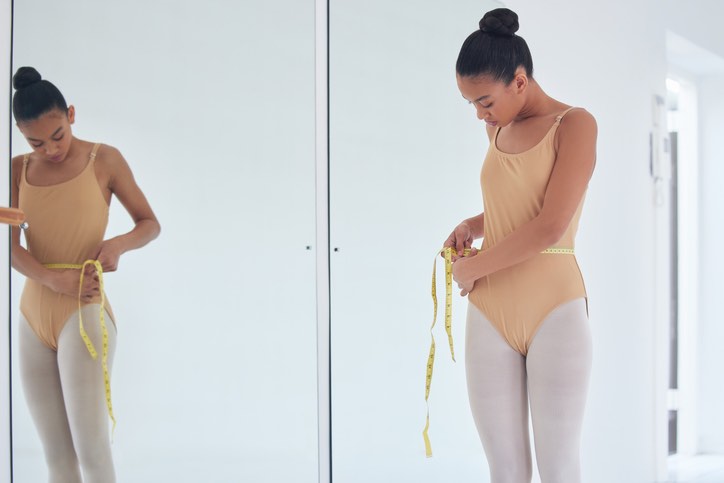
There’s no “right” way to talk about good personal hygiene with every tween or teen. Chances are your daughter already knows a little bit about the subject. After all, brushing her teeth, washing her hands, and showering are all personal hygiene habits that she does every day.
But now it’s time to add new life skills to the mix!
If the “talk” feels awkward (for you that is), you aren’t alone. You want to give your child the facts in a way that doesn’t embarrass her and doesn’t make you sound like a nagging parent who is going on and on about the benefits of bathing.
To make the most of this time, ease some of the tension, and help your daughter to feel comfortable with her changing body:
1. Start With What She Knows
Ask your daughter to start the conversation. She may know, or think she knows, a thing or two about puberty and personal hygiene habits. Not only will this tactic put your kiddo in control, but it can also help you to bust some myths she may have heard from her friends.
2. Get Scientific
Puberty isn’t embarrassing—it’s biology! Help your tween or teen learn about the physiology of puberty and why these changes are happening right now.
3. Share Stories
Did you forget to swipe on deodorant the other day and notice a not-so-friendly funk while in line at Starbucks? Let your daughter know that she’s not alone and that everyone, including mom and dad, has to deal with hygiene issues.
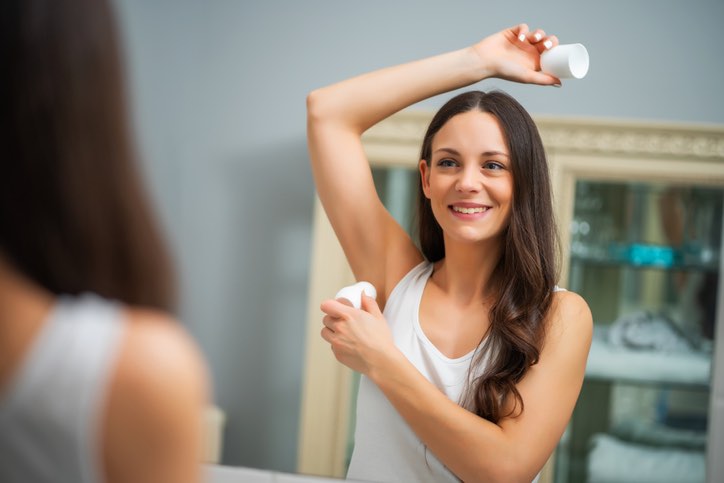
4. Encourage Questions
Let your child know you’re here for her. While you do need to provide plenty of info, give her the time and space she needs to ask questions. She might have concerns about basic hygiene that you don’t realize or didn’t already address.
5. Pick Products
Whether it’s her friends at school or TikTok tutorials or Instagram influencers, your daughter is getting recs galore for health, hygiene, and beauty products. Teen hygiene is a major industry. Ads and influencers can make it tricky to pick a deodorant, cleanser, shaving cream, mouthwash, or almost anything else she needs.
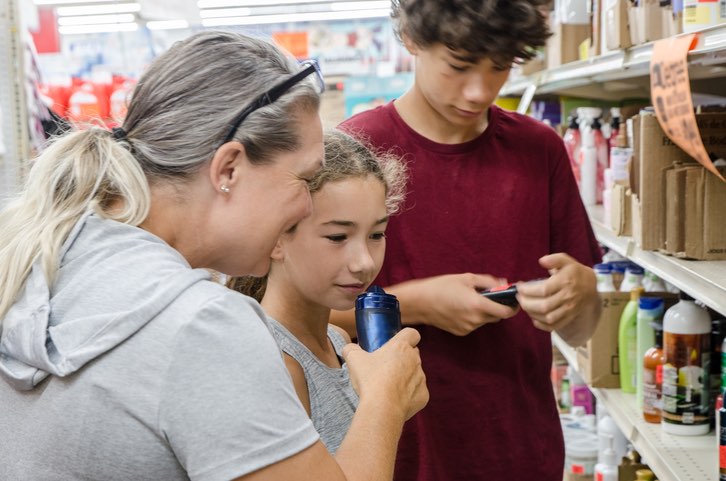
This is where you come in. Create a list of hygiene essentials and the products that she needs. Don’t worry if you’re not sure where to start, we’ve got you covered!
If your daughter already has her period, discuss feminine hygiene products, which ones to have on hand, how to handle potentially tricky scenarios such as swimming or intense exercise, when to change a product, and what to do if her period starts and she forgot to bring her product of choice with her.
What is Your Checklist of Hygiene Essentials for Young Girls?
After you have the healthy teenage hygiene talk you’re ready to move on and start picking products. Before you fill your virtual or in-person shopping cart with every type of product available, decide which categories of items your preteen or teen really needs right now.
This categorized checklist can help you to get a general idea of what your daughter needs and which products you should explore and when she needs to use them.
Avoiding Body Oder and Sweat Stains
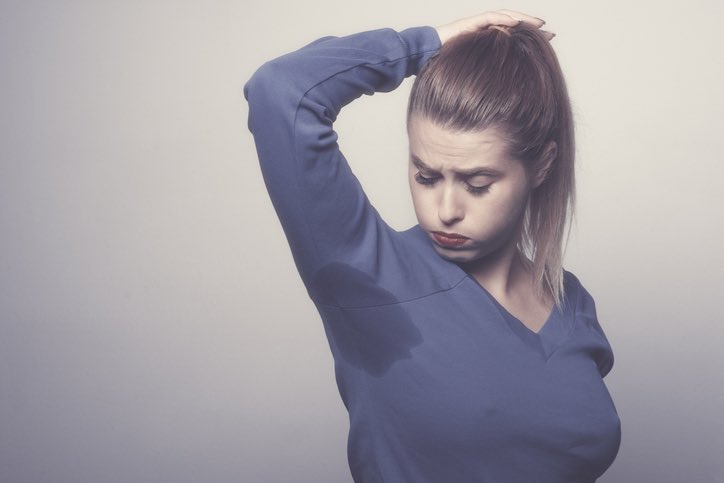
Feeling like you smell bad can be an embarrassing situation for a teen, so talk to your child about how to handle specific hygiene-related situations, such as showering after gym class, applying an extra post-jog layer of deodorant, or how excess body hair and odor interact.
- Deodorant or antiperspirant is a must during the tween and teen years to combat underarm odor. Your daughter should know when to apply this type of product, how much to use, and when to re-apply.
- Body wash and regular showers. Even though deodorant can help to nix odor from your teen’s armpits, it won’t help to keep your child clean. She already uses soap at home. But now that she’s older she might want to swap out the plain old bar or cartoon-covered body wash for a more grown-up version.
- Regularly doing laundry, including washing underwear and bras.
- Washing hair if it’s greasy. Greasy hair is a common issue during the teen years. The American Academy of Dermatology (AAD) recommends that people with oily tresses wash their hair more often.
Dental Hygiene
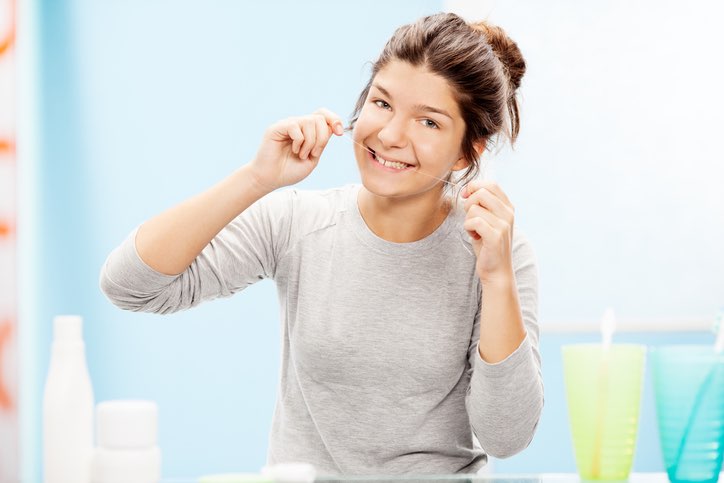
Fifty-nine percent of 12 to 19-year-olds have had a cavity (dental carry) in a permanent tooth, according to the National Institute of Dental and Craniofacial Research.
- You’ll need to get teens fluoride-containing toothpaste, floss, and possibly a mouthwash product.
- Your daughter may also need a pocket-sized floss to keep her teeth free of embarrassing leftover food debris.
Menstrual Hygiene and Period Products
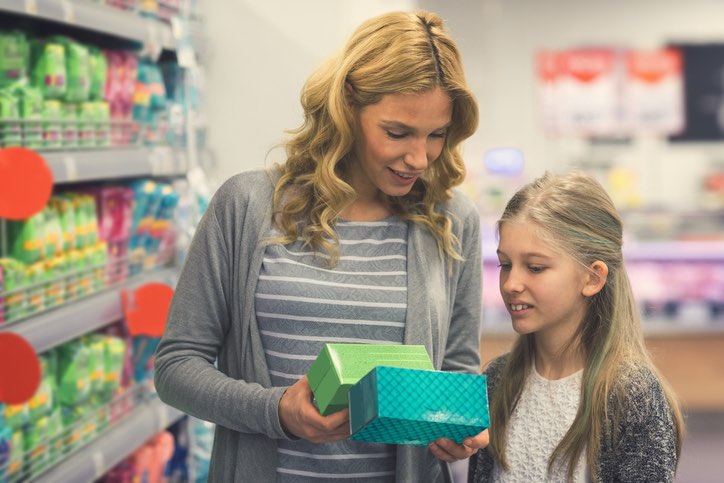
Teen girls will need to learn how to keep track of their menstrual cycles and use the right period products for their needs. Some things to introduce to your teen daughter during the “period talk include:
- Period Tracking Apps/Calendars to keep track of her cycle
- Heating pads and Ibuprofen/Midol to help with painful cramping and PMS symptoms
- Pads/tampons/menstrual cups in different sizes for light to heavy flow days
Body Hair and Shaving
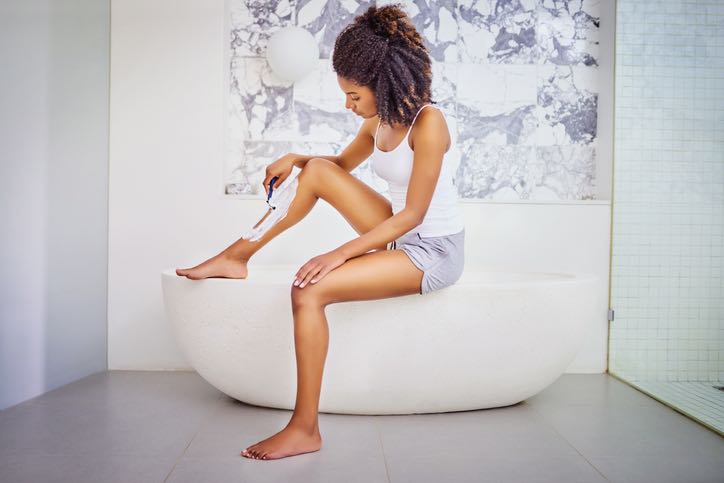
As your child’s pubic, leg, underarm, and other body hair begins to grow, you will need to discuss shaving options. Some young women prefer to go au naturale and skip the razor, wax, or other hair removal method.
If your tween or teen wants to get rid of unwanted hair, help her to choose a shaving cream and razor that won’t irritate her skin. You can also discuss facial hair removal methods if necessary.
- Razors and shaving cream
- Hair Clippers/trimmers for sensitive areas
- Tweezers
- Cream Hair removal products like Nair
Skincare and Acne Treatments
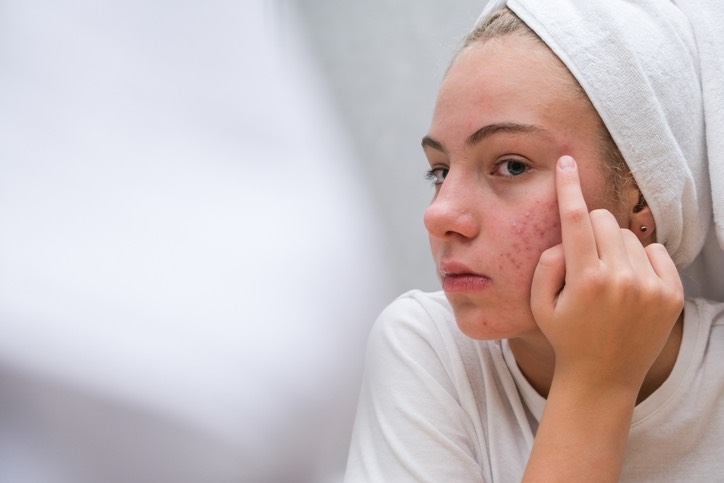
Acne-prone skin. The AAD notes that acne often begins during puberty and affects nearly 85 percent of 12- to 24-year-olds.
- A mild cleanser face cleanser with ingredients such as salicylic acid, benzoyl peroxide, or tea tree oil.
- An oil-free moisturizer to help balance her skin
- For severe acne, you may want to have your teen visit a dermatologist who may prescribe a stronger acne treatment medication like Accutane.
Teens who don’t have serious acne issues also need help learning about skin hygiene and should have a few products in their everyday skincare routine. This category could include:
- Facial cleansers
- Makeup removers
- Sunscreen
- Face moisturizers
- Body lotion
Talk to your child about how to store these products and when to replace makeup or other cosmetic items.
What NOT to Use
Vaginal Soaps / Speciality Products
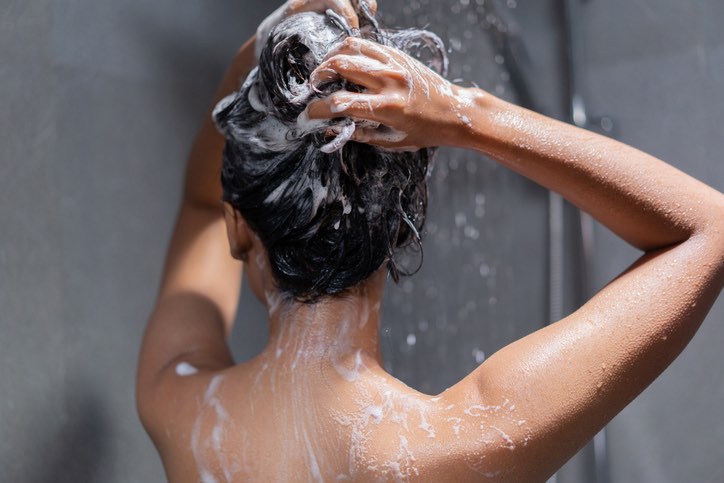
Your good habits and teenage hygiene talk may need to go past what to use and also focus on what not to use. Even though there are plenty of products advertised as genital cleansers or feminine refreshers, your daughter doesn’t need to douche or use a special vaginal soap.
According to the U.S. Office On Women’s Health, doctors don’t recommend douching. These products can change the natural pH balance inside of a vagina. This can cause an overgrowth of bacteria or lead to a yeast infection. It can also cause vaginal dryness or irritation.
Tweens and teens with sensitive skin or allergies may also want to stay away from scented soaps and lotions or anything with artificial colors. The same goes for scented deodorant and
antiperspirant products, shampoos, and conditioners.
—
For an easy-to-follow personal hygiene checklist and our recommendations for tween girl hygiene and self-care products, get The Essential Personal Hygiene Checklist for Tween and Teen Girls!

